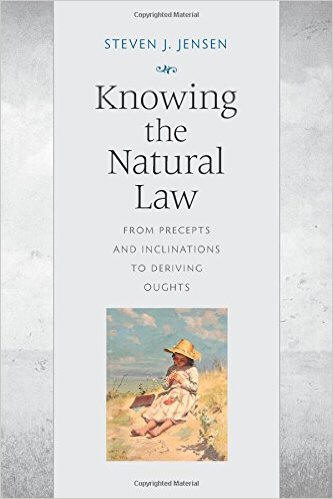Knowing the Natural Law:
From Precepts And Inclinations To Deriving
Oughts
Steven J. Jensen
The Catholic University of America Press (30 April
2015)
ISBN: 978-0813227337
 Although,
a little more technical than his excellent "Living the Good Life", this
book is still a wonderful read. It is much more than a critique of the new
natural law theory .
Although,
a little more technical than his excellent "Living the Good Life", this
book is still a wonderful read. It is much more than a critique of the new
natural law theory .
This theory holds that we cannot move from an "is" to an "ought" statement. Jensen shows that Aquinas had no such problems.
Jensen writes that the journey from is to ought has four levels of reasoning: speculative knowledge, materially practical knowledge, virtually practical knowledge and action. From a knowledge of the good, we arrive at what we ought to do.
Aquinas claimed that natural things have purposes and these purposes are found in our inclinations. Without this teleology, nothing is good or bad in nature. So, when Aquinas says that children ought to be born of men and women married to each other, the argument involves a detailed examination of animal behaviour in nature. Aquinas speaks of an end intended by nature. The intention of nature is connected to the natural law. Reason is based upon those things that are determined by nature: nature comes first. Aquinas can argue for the evil of fornication based upon the nature of the sexual act. Nature is the true standard of human action and reason is a standard only when in harmony with that nature.
It is also argued that deriving our knowledge of the good from observations of nature does not leave out the will. Aquinas says that reason is the rule of the will but reason is also measured by a higher standard, namely, by the eternal law.
All this is somewhat different from the perspectives of the new natural law theorists. Jensen takes various objections to traditional natural law theory raised by Finnis, Grisez and others. In turn, Jensen notes that the problem with having an array of basic human goods is that there is no way of giving priority to one over the other.
While this work is an excellent critique of the new natural law theory, it is much more than that.
Reviewed by Dr Pravin Thevathasan
